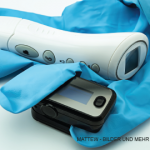Chest pain occurs in about half of patients. This tends to be pleuritic, with subdiaphragmatic inflammation, and a small pleural effusion may be found. Pericarditis is rare. Like other manifestations, this tends to resolve in three to seven days.
Rare manifestations include orchitis, myalgia or aseptic meningitis. Polyarteritis nodosa, Behçet’s and Henoch-Schonlein purpura occur with an increased incidence.
Quite a bit is known about the genetics of FMF, because there are a number of mutations of the MEFV gene. No null mutations have been identified. Two-thirds of patients actually have multiple mutations, which may result in gain or loss of function.
The MEFV gene is on the short arm of chromosome 16 and encodes pyrin, a 781 amino acid protein found in the cytoskeleton of neutrophils, synovial fibroblast, and dendritic cells. Pyrin is a major regulator of the inflammasome, a complex of proteins that trigger the release of IL-1 beta.
The most frequent mutation is M694V, which has a prevalence of 20–65%. Patients with M694V have the most severe phenotype, with arthritis, high fever, splenomelagy, more frequent attacks and a higher frequency of amyloidosis. M694V is found particularly in North African Jews.
Five mutations account for 75% of cases in Armenians, Arabs and Turks. One of these, E148Q, tends have a milder phenotype, with milder disease and less frequent attacks. This mutation has reduced penetrance.
The most dreaded complication of FMF is secondary amyloidosis, with deposition in the kidney, spleen, liver, heart, thyroid, testis and GI tract. Proteinuria, sometimes in the nephrotic range, can be followed by end stage renal disease from two to 13 years later.
Fortunately, most patients with FMF respond to colchicine. In fact, some experts argue that failure to respond to colchicine excludes the diagnosis of FMF. Ninety-five percent of patients improve, 75% with near remission. Presumably, colchicine’s mechanism of action is inhibiting cytokine production, especially IL-1, by the inflammasome. Colchicine may even have some efficacy in the prevention of amyloidosis.
A daily (quotidian) fever is characteristic of AOSD & is sometimes described as a picket fence fever, spiking in the afternoon or early evening, then returning to normal.
TRAPS
The third autoinflammatory syndrome that may present in adults is TRAPS, formerly known as Familial Hibernian fever. These febrile episodes last longer than in FMF or AOSD, up to two weeks in duration, and may occur every five to six weeks.
Most develop TRAPS in the first decade of life, but 10% present after the age of 30 years. This is the rarest of the three periodic syndromes, with a prevalence of about one in a million.


